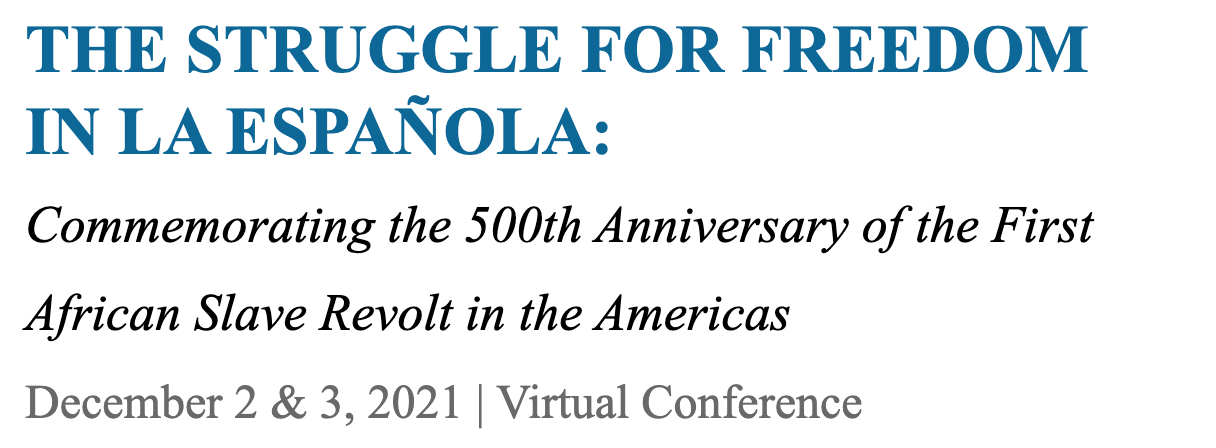
On the second day of Christmas in December of 1521, African Black enslaved people near Santo Domingo City broke free from their captivity, took to the streets, taking the lives of Spanish colonists that kept them in bondage and bought them as commodities. Consequently, the Spanish authorities issued laws to punish the rebels and prevent Black people from attempting to rise up again for their freedom. The Santo Domingo Slave Revolt of 1521 and the Slave Laws of 1522 have been recorded as the first of their kind in the history of the Americas. It is the plantation of Diego Colón, the son of Cristóbal Colón and Viceroy of the Indies, located on the north-west of today’s Santo Domingo Province, that became the scenario for the historic insurgence. The enraged mob moved westward along the Nigua River basin to Azua, another hub of early plantation slavery, planting terror on their path in an unbridled race away from evil. The Struggle for Freedom in La Española: Commemorating the 500th Anniversary of the First Slave Revolt in the Americas conference seeks to remember and honor the 500th anniversary of such a transcendental moment that marked forever the history of resistance of Black people in the New World.
Our intention with this multi-disciplinary conference is to have a conversation from multiple angles regarding the legacy of this open act of defiance, violation of norms, and confrontation against the Spanish empire. Specifically, we intend to create a lineal vision connecting the beginning of the resistance in the Americas, with its present and its future, as it relates to African Black people. More broadly, we want to explore the implications of that moment in the history of the world today, by re-creating in our imagination what the slaves did, and, through visualizing the present and the future, what is to be done, as Black people and other marginalized groups continue their quest for the right to self-determination and to resist all kinds of oppression.
The CUNY Dominican Studies Institute (CUNY DSI), the Black Studies Program at The City College of New York, and Centro Cultural Eduardo León Jiménes, in collaboration with:
African Studies Program at Penn State University, (here)
Afro-Latin American Research Institute at Hutchins Center, Harvard University, (here)
Archivo General de la Nación (here)
Center for Latino/a and Latin American Studies at Wayne State University, (here)
Center for the Study of Slavery and Justice, Brown University, (here)
Columbia University, African American and African Diaspora Studies Department (here)
Department of Latino & Caribbean Studies at Rutgers, (here)
Instituto de Historia del Consejo Superior de Investigaciones Científicas, (here)
Instituto Global de Altos Estudios en Ciencias Sociales, FUNGLODE (here)
John L. Warfield Center for African and African American Studies, UT, Austin (here)
Lapidus Center for Historical Analysis of Transatlantic Slavery at the Schomburg Center (here)
Master in the Studies of the Americas, Center for Worker Education, The City College (here)
The Department of African & African American Studies at Duke University (here)
invite submissions for The Struggle for Freedom in La Española: Commemorating the 500th Anniversary of the First Slave Revolt in the Americas conference. The conference will bring together scholars, students, and the public to engage in a dialogue about the formative role and legacy of rebellions in the Americas.
 Building upon The Santo Domingo Slave Revolt of 1521 and the Slave Laws of 1522: Black Slavery and Black Resistance in the Early Colonial Americas, a pathbreaking academic account of the rebellion and the ensuing first black code, conference organizers welcome questions about the insights the 1521 slave revolt offers into our understandings of colonialism, slavery, and resistance in the Americas: What are the legacies of the revolt in the Dominican Republic, Haiti, and the Circum-Caribbean? How does centering the 1521 revolt and histories of resistance in Española impact history, scholarship, and perceptions of the Dominican Republic?
Building upon The Santo Domingo Slave Revolt of 1521 and the Slave Laws of 1522: Black Slavery and Black Resistance in the Early Colonial Americas, a pathbreaking academic account of the rebellion and the ensuing first black code, conference organizers welcome questions about the insights the 1521 slave revolt offers into our understandings of colonialism, slavery, and resistance in the Americas: What are the legacies of the revolt in the Dominican Republic, Haiti, and the Circum-Caribbean? How does centering the 1521 revolt and histories of resistance in Española impact history, scholarship, and perceptions of the Dominican Republic?
We are interested in exploring questions that address:
• histories and practices of radicalism, civil disobedience, ruptures of social norms, etc. by oppressed classes against their oppressors;
• examinations of legislations, ordinances, laws, etc., restricting socially discriminated peoples;
• the historical memory and memorialization of resistance, whether social or in the intimacy of people’s homes;
• cimarronaje, piracy and the informal economy as counterinsurgencies against the status quo;
• the emergence of social norms/practices in the Americas diametrically opposed to those implemented by the Empire regime, whether Spanish, English, French, Portuguese, or Dutch.
We welcome proposals for individual papers, panels, workshops, roundtables, and creative writing submissions (poetry, fiction, creative nonfiction, theater, film, etc.) and nontraditional approaches to conference panels that engage resistance, insurgency, counter-discourse, ruptures, etc. Papers that center, examine, and engage the history of rebellion in any part of the colonial Americas are particularly encouraged.
Submissions for papers and creative works should include 300-word abstracts, paper titles, and short biographies with the presenter’s name, affiliation, and e-mail address. Proposals for panels, workshops, and roundtables should include 400-word collective abstracts, titles, and short biographies for all participants. Please send your submissions by October 31st to Sophia Monegro at smonegro@ccny.cuny.edu and Gabrielle Uribe guribe000@citymail.cuny.edu
Last Updated: 10/11/2021 19:20








